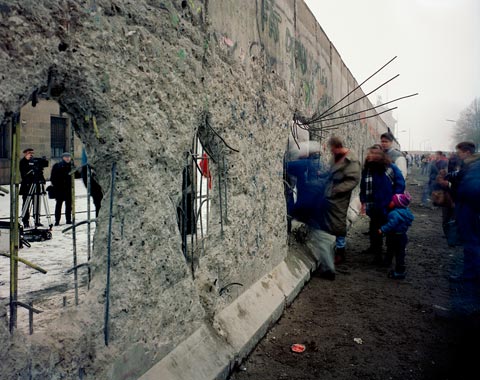Amsterdam/Spymaster

Berlin, 1989 (4x5 film)
I read this morning in the New York Times that former East German spymaster Markus Wolf died yesterday, 17 years to the day of the fall of the Berlin Wall. Wolf epitomized the romantic image of the Cold War spy, especially as portrayed in John Le Carré's novels. While the Cold War was commonly seen as an epic battle between good and evil, Wolf occupied the shadowy realm of moral ambiguity. He and his counterparts in the West played a game, albeit a dangerous one, of spy vs. spy. Huge bureaucracies on both sides of the Iron Curtain jockeyed for advantage using shreds of information--the fact and fiction culled from wiretaps, satellite photographs, and undercover agents.
It is important today to remember that despite all the detail of information gathered and analyzed, the CIA and other intelligence agencies failed to foresee the end of the Cold War before it all unraveled in 1989 with the opening of the Wall and the subsequent collapse of the Soviet Union. The spies got it wrong then, just as they got it wrong recently in the runup to the war in Iraq. In the end, the intricacies of the game tend to obscure clear facts on the ground, and the prism of politics distorts and corrupts.

Lenin bust at the Soviet embassy, Berlin, 1990 (4x5 film)
When I photographed the landscape of the Iron Curtain back in the '80s I sensed that the Cold War was reaching its denouement, though I had no idea that it would end so quickly. Over the course of a lifetime one has moments of prescience that are often not acted upon and go wasted. This was one time I seized the moment and stayed with it as history unfolded.
My photographs of the Iron Curtain can be found here. (website)
A song I wrote about spies at the end of the Cold War can be listened to here. (mp3)
And another about the fall of the Soviet Union is here. (mp3)

0 Comments:
Post a Comment
Links to this post:
Create a Link
<< Home